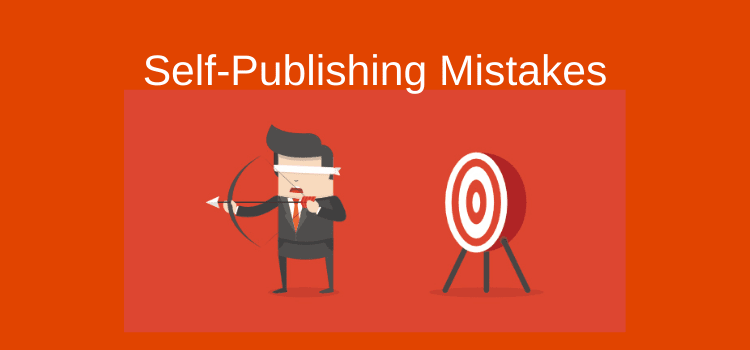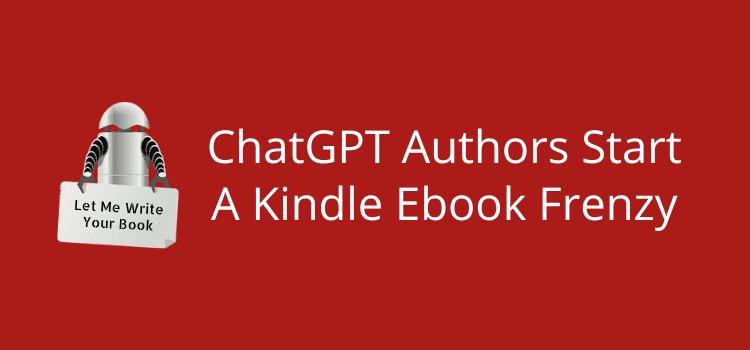
Succeeding at self-publishing, gaining readers, and selling books are not easy tasks. However, some mistakes new self-publishing authors sometimes make can make success even more difficult.
If you avoid making the following mistakes, your book will have a much better chance of success.
For new authors, you need to change your mindset from being a writer to thinking like a publisher.
What can you do to give your book its best chance?
When you write a book and publish it, you become an author.
With it comes being open to criticism, and there is no way to hide and avoid it.
You will get good and bad book reviews on Amazon and elsewhere, and your book may succeed.
But it will likely fail to sell in significant numbers outside your friends and family.
That’s the publishing industry. It’s a gamble, and the truth is that publishing, especially fiction, has always been a gamble.
Yes, there are self-publishing success stories, but they are few and far between.
It is the same ratio for independent and traditional publishers.
Not every book sells a million copies.
You might have written a good book or even a great book.
But how can you put your best foot forward and give your book the best chance of selling?
You’re a new author and thinking about self-publishing.
Well, you won’t find a definitive rulebook to follow.
It’s nothing like traditional publishing with a publishing house.
Self-publishing means managing everything from writing and editing to cover design, formatting, and book marketing.
But luckily, there is a wealth of self-publishing advice available online.
You can find established authors, publishing blogs, Facebook groups, and social media writing forums to help you.
There’s no shortage of valuable resources available online.
But it’s important not to rush into self-publishing.
So much can go wrong with a print-on-demand paperback or ebook.
It pays to take the time to research the technical side of the self-publishing process, as well as the costs, marketing, and distribution options.
You also need to have a good understanding of your target reader audience and how to reach them.
However, there are vital aspects of self-publishing, and you always need to get right to give your book a chance of success.
To give you a quick shortcut, here is a list of six of the most common mistakes that authors new to self-publishing can make.
Hopefully, you can avoid all of them.
1. A poorly edited manuscript
It’s true that not every author can afford a professional editor.
But that doesn’t excuse a manuscript with poor sentence structure, grammar and spelling errors, and annoying typos.
I’m an English teacher, so, of course, I thought I knew how to proofread.
How wrong I was. It only took a few bad reviews and a lot of embarrassment for me to realize the errors of my ways.
There is no way that writers can accurately edit and proofread their writing, no matter their ability or qualification.
Yes, you can find some grammatical errors and typos and make notes for revision.
But a writer’s brain is a strange beast. You are so connected to the story that your brain can easily overlook obvious errors.
It can happen even in a short text, such as a book description or author bio, which is a disaster.
Proofreading is hard work. You can ask friends and family to help you. Try to find beta readers or engage a competent proofreader.
Never publish a book until it has been proofread by as many sets of eyes as possible. But if you can afford a professional editor, so much the better.
The rush to publish a poor manuscript is one of the common mistakes in self-publishing and is a recipe for disaster.
Wait, wait, and wait until your manuscript is error and typo-free.
2. An unappealing book cover
Publishing a book with a poor-quality cover is a very common mistake new authors can make.
Compare your cover to other titles in your genre, and then be very honest. If you created your book cover yourself, be super honest.
If your cover is unappealing to your target audience, selling your book will be tough work.
Almost everything to do with the self-publishing process can be done for free.
But a great book cover is not necessarily one of them.
If you pay for nothing else in your publishing process, invest a little money and pay for a professional book cover designer.
This is a must if you want to publish a print-on-demand paperback version of your book.
However, there is a little more latitude with ebooks.
You could try Canva as a free ebook cover creator to help you improve the quality of your ebook cover.
3. A rushed book description
Writing a book description that will hook potential readers is, in some respects, almost as difficult as writing the book itself.
Again, look at other titles in your genre.
Read the descriptions and look for ideas to improve your text.
If you have some reviews, you can add these to your book description using your Author Central page to modify your book details.
If you think you need help, consider hiring a good copywriter.
4. No book marketing plan
If you want to sell books, you need to plan your book marketing and promotion well before you publish your book.
Trying to develop a plan after you publish your book is a very common mistake.
You need to create some hype for your book and perhaps get some pre-orders to help your sales rank for your book launch.
Some of the best ways to promote your book online and on social media are free.
However, you might consider investing a little in some paid book promotion.
One advantage of paid promotion is that it helps you gain access to a new and far wider book-buying audience.
But don’t spend a cent without first making a detailed marketing plan.
Set a strict budget and understand how to monitor your results.
A little can go a long way if you have clear goals and limits.
5. Poor categories and keywords
Being meticulous with your categories and keywords is the best way to attract book buyers who use Amazon search.
It might not seem important when you publish your book.
But your choice of categories could be far too broad to attract readers.
Researching your best possible narrow, niche categories is vital in attracting your target audience and potential book buyers.
Check how you can help your category choices, particularly on Amazon, by using keywords to increase the search visibility of your book.
When you choose your seven keywords, don’t be in a hurry.
Do your research and select seven keyword phrases (not single words) that will help you sell your book.
Along with your three categories, your choice of these seven keywords is by far the most important way for readers to find your book.
Do your category and keyword research well before you plan to publish your book.
Making these choices quickly at the time of publishing is often a big self-publishing mistake new authors make.
6. Your book is for everyone
It’s easy to think that everyone will love your book because it’s such a great story with engaging characters.
Plus, it’s got a surprising twist at the end, and it’s got a bit of everything for everyone.
In reality, book buyers are extremely fussy and buy far fewer books than you think.
It takes a lot of research to understand a little about where your reading demographic market and target audience lies.
Trying to sell your book to everyone wastes a lot of time and money and is one of the most common misunderstandings.
You need to know your market and think about who you are writing for.
Then, you can plan much more targeted book marketing and promotion.
Summary
Self-publishing is not a race.
Remember that major publishing houses take a year or more to prepare a book for publishing.
Granted, you’re self-publishing, so you have an advantage.
You can probably do it in nine, six, or even three months.
But one of the most common missteps is rushing too quickly to publish a book before you are ready.
Make sure everything is absolutely perfect before you even think about publishing your book, and then have realistic expectations.
But if you have published your book without a plan, you can play catch up by trying to correct 15 common self-publishing problems.
Related Reading: Should I Stay In Amazon Kindle KDP Select Or Open Publish My Ebooks?
Share This Article


